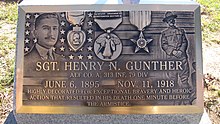Henry Gunther
Henry Gunther | |
|---|---|
Baltimore | |
| Allegiance | United States |
| Service/ | U.S. Army |
| Years of service | 1917–1918 |
| Rank | Sergeant (up to July 1918 or later) Demoted to private Posthumously restored to Sergeant |
| Unit | 313th Infantry Regiment, 79th Division |
| Known for | The soldier who died one minute before the end of World War I |
| Battles/wars |
|
| Awards | |
Henry Nicholas John Gunther (June 6, 1895 – November 11, 1918) was an American soldier and possibly the last soldier of any of the belligerents to be killed during
Gunther had recently been demoted, and was seeking to regain his rank just before the war ended.[3]
Early life
Henry Gunther was born into a German-American family in east
Military service
Being of recent German-American heritage, Gunther did not automatically enlist in the armed forces as many others did soon after the United States declared war on Germany in April 1917. In September 1917, he was drafted and assigned to the 313th Infantry Regiment, nicknamed "Baltimore's Own"; it was part of the larger 157th Brigade of the 79th Infantry Division. Promoted as a supply sergeant, he was responsible for clothing in his military unit, and arrived in France in July 1918 as part of the incoming American Expeditionary Forces. A critical letter home, in which he reported on the "miserable conditions" at the front and advised a friend to try anything to avoid being drafted, was intercepted by the Army postal censor. As a result, he was demoted from sergeant to private.[3][6]
Gunther's unit, Company 'A', arrived at the
Gunther's remains were returned to the United States in 1923 after being exhumed from a military cemetery in France, and buried at the Most Holy Redeemer Cemetery in Baltimore.
Memorials

On "
See also
- Albert Mayer, the first soldier killed, 1914
- George Edwin Ellison, the last British Army soldier killed, 1918
- George Lawrence Price, the last Canadian Army and British Empire/Commonwealth soldier killed, 1918
- Marcel Toussaint Terfve, the last Belgian soldier killed in World War I, 1918
- Augustin Trébuchon, the last French Army soldier killed, 1918
- John Parr, the first British Army soldier killed, 1914
- Jules-André Peugeot, the first French Army soldier killed, 1914
- History of the Germans in Baltimore
References
You can help expand this article with text translated from the corresponding article in German. (October 2012) Click [show] for important translation instructions.
|
- ^ Hayes-Fisher, John (October 29, 2008). "The last soldiers to die in World War I". BBC News. Retrieved October 24, 2012.
- ^ a b c d e f g Meyer, Eugene (November 1, 2008). "The Unknown Soldier". Maryland Life. Archived from the original on December 29, 2010. Retrieved October 25, 2012.
- ^ Baltimore Sun. Archived from the originalon 2014-10-06. Retrieved October 24, 2012.
- ISBN 0-375-50825-2.
- ^ a b c d "Dedication of the Memorial to Brother Knight Henry N. Gunther" (PDF). Maryland State Council of the Knights of Columbus. 2011. Archived from the original (PDF) on April 2, 2014. Retrieved October 25, 2012.
- ^ a b c Persico, p. 134.
- ISBN 9781434474278.
- ^ Persico, pp. 134-135.
- ^ a b Persico, p. 351.
- ^ Persico, p. 394.
- ^ Persico, p. 378.
- ^ "Un drapeau pour Henry Gunther". L'Est Républicain (in French). November 9, 2017.
